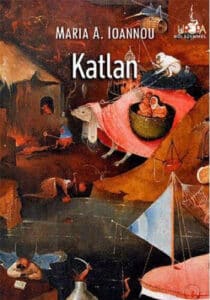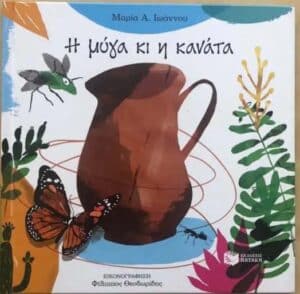In a micro-fiction writer, THEO PANAYIDES finds a restless soul focusing on the details others miss who, in turn finds herself at a very interesting age
Open the book – I Endiamesoi, a.k.a. The In-Betweens, by Maria A. Ioannou (not yet translated into English, alas) – and you’ll find a one-page micro-story called ‘Microscopic House’: “‘Heeeeeeeeeeeeeeeeeeelp!’ yelled the old lady from the microscopic window of her microscopic house, surrounded by three blocks of flats, four including ours”. The story continues in that vein (it’s only about 150 words long) followed by other stories in Greek, plus about a dozen interludes in Cypriot dialect – then, at the end, the people from the interludes have something of an existential moment, their dialogue spread out over several sparsely typed pages. “Nitsa, we’re in a book.” “A book?” “Can’t you see the pages turning?” “Is it a history book?” “No, it’s literature.” And so on.
Opening the book – and being struck by that eye-catching style – was my unexpected gateway, the act that sparked an interest in meeting Maria. The other reason (given that we are, after all, an English-language paper) is that, even though all her five books are in Greek – The In-Betweens is the fifth, published a year ago – she also writes in English, studied English Literature at Reading and has appeared in English-language outlets including, for instance, Milk Candy Review, an American flash-fiction journal specialising in “beautifully weird stories”. Maria’s is called ‘This could be a story about people’, and begins thus:
“But it’s a story about leaves. How they chase one another with noise, discreet noise, or no noise, a delirious crunchiness, twisty, hard, soft, wrinkled, leaves like dysmorphic kids in a minefield, with squashed greenish veins, how leaves fall, how leaves fall all the time, it’s ok to fall, leaves do that every day and nothing terrible happens, nothing monstrous. This is a story about leaves that are still leaves, no matter what, flying, shaking, lingering, whipping window glass, committing suicide while chasing rainbows, hurricanes, the burning sun, reaching out, touching other leaves, sliding on frowned, happy or in-between faces, escaping from roofs or mother trees, snatched on roofs or mother trees, benches, garbage bins, piling up on moth-covered graves…”

She looks the part of the somewhat flamboyant writer, to be sure, slim and rather impish in a striking pink top (she wears bright colours in general), her reddish hair done in a style – short on one side, falling in a kind of post-punk cascade on the other – that we both agree looks like an 80s pop star, though we can’t decide which one. Then again, that mane of hair tells a tale – because it was something else back in her 20s: it was long, it was luxuriant, it was a protagonist in its own secret story. It was a case of “Maria’s hair, then Maria walking behind it,” she recalls. “I never expected I would cut my hair, ever!” – but the lush mane was gradually shorn of its glory as the years went on, until now only the cascade remains, a kind of muted tribute to her younger self. She turned 40 last year, an age she diplomatically calls “very interesting”.
Actually, it’s more than just interesting. “I’m kind of between an older version of myself and a new version of myself,” she muses. “I never expected it would be like this – it’s as if you pass that gate of the 40s and suddenly your mind changes… You’re in-between, that’s the strange thing about it. When I was 39, I felt totally different.”
In-betweenness haunts our conversation so ubiquitously it’s almost like it was planned – or as if her writerly instincts snap into place, subconsciously adding structure and an underlying theme to the story of her life. Maria’s age, as already mentioned, is an in-between age. One of her favourite times to write is early in the morning, immediately after waking up, “because you’re still between the subconscious and the conscious”. Her 11-year-old daughter is also at an in-between age, seesawing between childish whims and adolescent moodiness. Her husband (they got married in 2010) is another in-betweener, an accountant but with certain artistic leanings: “If you saw him, you wouldn’t believe that he’s an accountant… I think that’s the reason we are together”. Her language, of course, is also in-between. While being feted at the Thessaloniki Book Fair last month, she was asked by a moderator where she locates herself – whether in Greek, English or Cypriot literature – and could only reply that it was all of the above. A few of the stories in her latest book (like ‘Pitsounakia’, or ‘Love Birds’) were originally written in English – yet it’s also true that “I’m missing something in the English language, because I’m not into the culture”. She’s probably funniest writing in English, she reckons, whilst “in Cypriot dialect I can describe the darker and more intense feelings that I can’t describe when I speak Greek, for example”. In the end, of course, it doesn’t really matter: “I think literature is [in] the way you see things… A point of view that is – not common, let’s say”.

The ‘crazy things’ weren’t particularly crazy – just “basic things” for a young person: concerts, parties, occasional dabbling in this and that – but they bumped against a certain cautious part of her personality, and perhaps her upbringing. “I think this is the story of my life,” sighs Maria. “Because I think writing was for me a way to break through, to kind of – speak up, and express myself. At home I felt a bit more reserved, more traditional, that I had to do certain things and follow certain rules. So writing, for me, was the space to actually express all that essence and diversity I had inside.”
Her dad was a public-school teacher, her mum a housewife who also helped at the private institute run by the family. Their only daughter (she has two brothers) wanted to study ballet, but was dissuaded by the old ‘How will you make money?’ spiel. (English Lit was just about acceptable, presumably seen as a path to becoming a teacher.) “I always felt a bit different than other people at school,” she recalls – though the precise shade of that difference is interesting. She wasn’t shy, or unpopular, or alienated; but sometimes she’d be miles away, and other kids would make fun of her, or else when she did talk “I’d focus on details that some people would find weird at the time. I remember this feeling, when I’d say something – the look on people’s face, like ‘OK, what was that?’”. That, you might say, is literature: focusing on details others miss, that uncommon point of view again.
Her influences include many of the usual suspects: Kafka, Beckett, Virginia Woolf, Jonathan Safran Foer – who also incorporates visual elements, “not just the words that appear on the page, but also the way they appear on the page” – the Israeli short-story writer Etgar Keret. The singular thing is her style, the restlessness, the experimentation: The In-Betweens includes photos (taken by Maria herself) that comment on the text, alternates between Greek and Cypriot, veers between micro-fictions, comic skits, ostensible poems – though “I don’t process them as poems when I write them” – and passages of ‘automatic writing’. One story is about a man whose right hand shoots up in a Nazi salute when he’s stressed, causing all sorts of problems. Another – about a man who, based on a childhood misunderstanding, thinks that every injury or deformity is caused by the victim having crossed the Green Line – does mention the Cyprus problem, but “not in the way it should be mentioned”.
Partly, she admits, this is all a sign of the times: a post-modern restlessness, an interest in form over content. Online publishing has amplified the trend of short attention spans; people like to read on the go. Today’s stories are less likely to delve into inner lives and explore relationships – “but they do mirror a contemporary reality, which is more recyclable, and fast, and sometimes one-dimensional”.
Her own personality also plays a role, in a number of ways. One, as already mentioned, is the fact that writing is a kind of release for Maria – so boldness and freedom are par for the course, “it comes naturally”. Another is the fact that restlessness, too, comes naturally; she needs movement, mentally and physically. She’ll walk for an hour every morning – or swim, in summer – after taking her daughter to school and before sitting down to write. (She writes in the mornings, though not every day; she also makes ends meet by teaching English, and working as a local fixer for EU programmes.) Dance – the definition of movement – has been a major part of her life, ballet in her teens, tango as an adult. Micro-fiction fits her temperament: “I cannot appreciate the stillness of life, of being in one place for a long time – of working on one book, one story for a long time”.
In a bigger place, Maria Ioannou might’ve been pressured – by agents, say – to tone down the wackiness and become more conventional; but that’s the “double-edged sword” of living in Cyprus, a place without agents (least of all for short-story writers) and a small, if close-knit, community. “If you’re in Cyprus you feel restricted, you feel like you’re in a desert, let’s say – so you’re [also] thirstier, and you have this motivation which someone else, who has everything, doesn’t have. You push your boundaries more, because you have nothing to lose”. Admittedly, most fall back on trying to copy whatever’s trendy in Greece, placing themselves at a double disadvantage – but “in my case it works out,” she shrugs. A small place even suits her cautious side, like her small fictions: “I feel I can control more easily small texts, small spaces”. There’s something rather cosy in Maria, side-by-side with something restless and untrammelled. She is, in a word, in-between.
Cyprus is in-between too, culturally speaking: “We don’t really know our identity… We always want to be something else, or to belong to a bigger picture”. (Limassol may be an especially violent illustration of that theory.) And indeed there’s yet another in-betweenness, her penchant for combining literature with other arts to create intriguing hybrids. She’s written texts for dance, working with the choreographer Evi Panayiotou (Maria reads aloud, narrating her texts; the dancers react to the rhythm), and founded an interdisciplinary festival called Sardam in 2013.
This could be a story about leaves, blown from one place to another like the restless snippets in Maria Ioannou’s books, perpetually in motion; but it’s actually a story about people, who get sad sometimes. There’s a trauma underlying her work, she affirms – a darkness, for sure – but it’s subterranean, as it is in her own life: “I mean, the traumas I have as a person, they’re never directly expressed. They kind of linger, they flow underneath”.
She doesn’t say what those traumas are. Maybe they’re not even too traumatic, like the rather generic ‘crazy things’ she did (but stopped herself from overdoing) as a youngster. I don’t get a sense that her psyche is especially tortured, or her life especially sad. The point is the way she lives that life – and the way it gets channelled into surreal, zany fiction. Would she have preferred being born into some artsy bohemian family, in Berlin or London, say? Maybe, she replies – “but then I don’t know if I would write”. Better to remain in-between.







Click here to change your cookie preferences